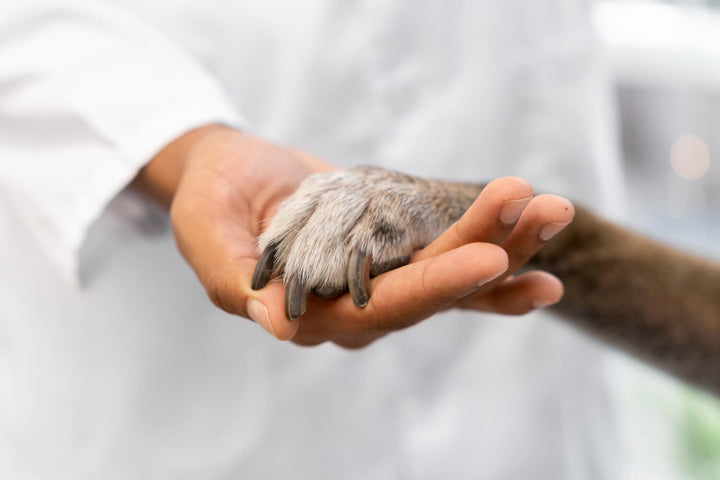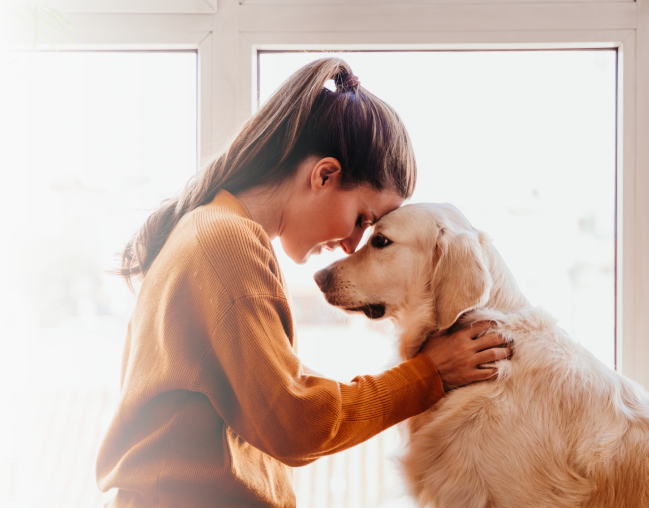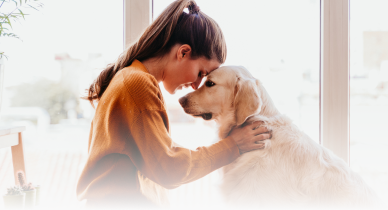The Cavalier King Charles Spaniel Dog Breed
Written By: Lindsay Giguiere
Editor: Julie Zawadzki
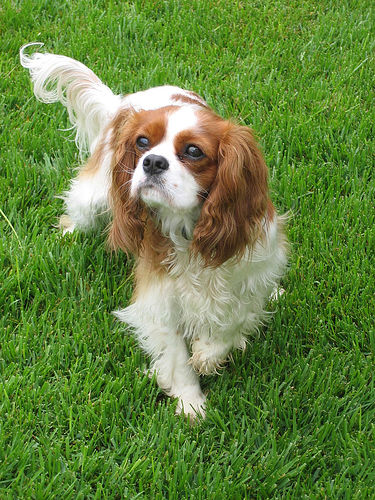
The Cavalier King Charles Spaniel is a captivating breed that combines elegance with affection. Their regal name reflects their noble appearance, which is characterized by expressive eyes and silky, flowing ears. But beneath their graceful exterior lies a heart full of love and an enthusiasm for companionship. These dogs have a rich history, dating back to royal courts, and they've transitioned seamlessly into modern family life as cherished companions. Whether you're seeking a loyal lap dog or a joyful playmate, the Cavalier King Charles Spaniel is sure to capture your heart.
Did You Know these Facts about the Cavalier King Charles Spaniel?
-
These dogs were named after King Charles II of England, who adored them and often had several by his side.
-
Cavaliers come in two sizes: standard and petite. This breed's versatility suits various living arrangements.
-
Cavaliers are known for their friendly nature, making them excellent therapy dogs and reliable family pets.
-
Their long, silky fur requires regular grooming to maintain its lustrous appearance.
- While generally healthy, Cavaliers are prone to certain heart and joint conditions, so regular vet check-ups are essential.
In the realm of registered breeds, the Cavalier King Charles Spaniel enjoys a place of distinction; in fact, it ranks #14 in the American Kennel Club´s popularity list. Their enduring popularity places them comfortably among the top-ranking breeds, a testament to their universal appeal. Their elegant charm and adaptable nature have captured the hearts of dog lovers around the world.

Traits of the Cavalier King Charles Spaniel Breed
Overall Personality. Cavalier King Charles Spaniels are a symphony of love, affection, and friendliness. They're famously gentle, sociable, and eager to please. Their devotion to their families is unwavering, making them perfect companions for adults and children alike. Cavaliers are known for their sunny disposition, due to their perpetually happy expression.
Family Life. As family dogs, Cavaliers shine brightly. They thrive in the company of their human pack and adore cuddles on the couch just as much as outdoor adventures. Their gentle temperament makes them excellent choices for households with children, and they get along well with other pets, too. This breed excels at adapting to your family's lifestyle, whether it's a bustling home or a quiet, cozy retreat.
Physical Appearance. The Cavalier King Charles Spaniel boasts a striking, symmetrical appearance. Their expressive, large eyes exude warmth and friendliness, while their ears are silky and feathered, framing their faces with elegance. The coat comes in four distinct color patterns: Blenheim (rich chestnut markings on a pearly white background), Tricolor (jet black markings on a pearly white background), Black & Tan (black with tan markings), and Ruby (solid chestnut). Their graceful, compact bodies are well-balanced, and they possess a gently wagging tail.
Sociability. Social butterflies by nature, King Charles Cavalier Spaniels adore interacting with people and other dogs. Their friendly demeanor makes them a favorite at dog parks and playdates. They're equally content snuggling at home or exploring new places with their families. This breed is known for its ability to form strong bonds, which can lead to some sweet and affectionate moments.
Average Sizes & Life Expectancy
- Height: 12 to 13 inches tall (30 to 33 cm)
- Weight:13 to 18 pounds (6 to 8.2 kg)
- Life Expectancy: Around 9 to 14 years
Detailed Description of the Cavalier King Charles Spaniel Breed
The Cavalier King Charles Spaniel, with its distinctive appearance and endearing personality, is a breed that has won the hearts of dog enthusiasts for centuries. These dogs are often described as "affection wrapped in elegance," and rightfully so. Let's continue our deep dive into the world of Cavalier King Charles Spaniels, exploring their history, physical characteristics, temperament, adaptability, care requirements, and even their presence in popular culture.
Physical Appearance. Cavaliers possess an elegant and symmetrical appearance that is truly captivating. Their large, expressive eyes are one of their most notable features, and they often radiate warmth and affection. Framing their endearing faces are long, silky ears, which are a defining characteristic of the breed.
Temperament and Personality. Cavalier King Charles Spaniels are renowned for their friendly and affectionate nature. They are true companions, always seeking to be by their owner's side. These dogs are often described as "Velcro dogs" because of their tendency to form strong bonds with their human family members.
Their temperament is marked by gentleness, loyalty, and an eagerness to please. Cavaliers are particularly well-suited for families, as they are excellent with children and get along harmoniously with other pets. Their playful disposition is ever-present, and they seem to have an innate ability to bring joy to those around them.
Adaptability. One of the standout qualities of Cavalier KIng Charles Spaniels is their adaptability. Whether you live in a bustling city apartment or a quiet suburban home, these dogs can comfortably fit into your lifestyle. Their adaptable size, available in standard and petite varieties, makes them suitable for a wide range of living spaces.
Moreover, their friendly nature and love for human interaction make them perfect for families and individuals alike. Cavaliers thrive on companionship, and their adaptable disposition allows them to embrace both active outdoor adventures and cozy indoor moments.
Care Guidelines. Due to their long, silky coats, Cavalier KIng Charles Spaniels require regular grooming to keep their fur in optimal condition. Brushing a few times a week helps prevent mats and tangles. Regular ear cleaning is essential because their ear structure can lead to ear issues if not properly maintained.
Exercise. While they enjoy outdoor play, Cavaliers are not excessively energetic dogs. Daily walks and some playtime should suffice to keep them happy and healthy. They are equally content snuggling on the couch or going for a stroll in the park.
Training Strategies. Cavaliers are intelligent and eager to please, making them highly trainable. Positive reinforcement methods work best with this breed. Be patient, consistent, and provide plenty of love and rewards during training sessions.
Notable in History. The history of the Cavalier King Charles Spaniel is entwined with the corridors of royalty. Originating in England, these dogs earned their moniker from the 17th-century British King Charles II, who was deeply enamored with them. It is believed that King Charles II was so fond of his spaniels that he often allowed them to accompany him in the royal court, which, in turn, elevated their status to that of cherished royal companions.
Historically, the breed's roots trace back to toy spaniels found in Europe during the Renaissance period. These dogs were crossbred with Asian toy breeds, resulting in the distinct appearance that we associate with King Charles Cavalier Spaniels today. The breed's evolution continued, with an emphasis on preserving its regal and elegant attributes.
What to expect when living with the Cavalier King Charles Spaniel Breed
Personality. Cavaliers are renowned for their affectionate nature. They are true velcro dogs, always seeking the warmth of human companionship. Expect them to follow you around the house, curl up on your lap, and shower you with unconditional love.
These dogs have a temperament that's as soft as their silky fur. They are gentle with children, making them excellent family pets. Their friendly disposition also extends to other animals, so they typically get along well with other pets in the household.
Ideal Environment. Cavaliers are versatile when it comes to living environments. Whether you reside in a bustling city apartment or a quiet suburban neighborhood, they can adapt to your surroundings. Their adaptability also extends to various living situations, from families with children to retirees seeking a loving companion.
Maintenance Level. While they enjoy outdoor playtime, Cavaliers are not overly energetic dogs. A daily walk and some playtime in the yard usually suffice to keep them happy and healthy. They are equally content snuggling on the couch or going for a leisurely stroll.
Grooming a Cavalier is relatively straightforward. Their long, silky coats require regular brushing to prevent mats and tangles. Occasional ear cleaning is essential due to their unique ear structure. While they enjoy playtime, they are not highly demanding in terms of exercise.
Overall Health Expectations and Best Health Tests for the Cavalier King Charles Spaniel Breed
Health Considerations. Cavalier King Charles Spaniels are generally healthy dogs, but like all breeds, they can be prone to certain health issues. Being aware of these potential concerns and conducting appropriate health tests can help ensure a long, happy life for your furry companion.
Heart Conditions - Mitral Valve Disease (MVD) is a common heart condition in Cavaliers, especially as they age. Regular veterinary check-ups and cardiac evaluations are essential to monitor heart health.
Eye Problems - The breed is also prone to eye conditions such as cataracts and retinal problems. Regular eye examinations can help detect and address these issues early.
Joint Problems - Cavalier King Charles Spaniels can develop joint problems including hip dysplasia. Maintaining a healthy weight, providing joint supplements, and ensuring low-impact exercise can help mitigate these concerns.
Ear Health - Due to their long, floppy ears, Cavaliers can be susceptible to ear infections. Regular ear cleaning and inspection are crucial to prevent issues.
Recommended Health Tests. Aside from the health concerns mentioned, and the tests required, dental health is vital for Cavaliers. Regular teeth brushing and dental check-ups are recommended to keep their mouths healthy.
Best Nutrition, Diet & Supplements for the Cavalier King Charles Spaniel Breed
Nutrition and Diet. Proper nutrition is essential for the health and well-being of your Cavalier King Charles Spaniel. Here are some guidelines to ensure your furry friend thrives:
Cavaliers thrive on a balanced diet that includes high-quality commercial dog food or a well-prepared home-cooked diet.
Look for dog food brands that list meat as the primary ingredient, as this provides the essential protein they need. Protein is a vital component of their diet, helping to build and repair tissues. Choose dog food containing real meat, such as chicken, beef, or fish, as the primary protein source.
Moderate levels of fat are necessary to support their active lifestyles and maintain their coat's sheen. Opt for dog food with healthy fat sources like chicken fat or fish oil.
Cavaliers do well with carbohydrates from sources like whole grains and vegetables. These provide energy and fiber for digestion.
Hydration is Key. Ensure your Cavalier always has access to fresh, clean water. Proper hydration is vital for digestion, temperature regulation, and overall vitality.
Supplements. While a balanced diet should provide all the necessary nutrients, some Cavaliers may benefit from supplements. Glucosamine and chondroitin supplements can support joint health, which is essential due to their susceptibility to hip dysplasia. Always consult your vet before adding supplements to their diet.
Foods to Avoid. Certain foods can be harmful for Cavalier King Charles Spaniels, including those with artificial additives, preservatives, and excessive fillers. Chocolate, grapes, raisins, and foods high in salt are toxic to dogs and should be avoided entirely.
Maintain a healthy weight for your Cavalier by controlling portion sizes. Obesity can lead to various health issues, so follow feeding guidelines on the dog food packaging and adjust as needed based on your dog's activity level and age.
Grooming Requirements for the Cavalier King Charles Spaniel Breed
Coat Maintenance and Shedding. Cavaliers have a medium-length, silky coat that can come in various color combinations, including blenheim, tricolor, black & tan, and ruby. Their coat is prone to matting and tangling, so regular grooming is a must.
Brushing. Daily brushing is ideal to prevent tangles and mats. Use a soft bristle brush or a pin brush to gently work through their fur. Pay extra attention to areas like the ears, chest, and legs, as these are more prone to matting.
Cavaliers are moderate shedders. While their shedding is not as excessive as some breeds, you can expect some hair around your home, particularly during seasonal changes. Regular brushing can help manage shedding.
Paw Care and Hygiene. Check their paw pads regularly for signs of damage or injury, especially if they are active outdoors. Trim their nails every few weeks to prevent overgrowth, which can lead to discomfort and posture issues.
Ear and Eye Care. Check their ears weekly for signs of infection, wax buildup, or foreign objects. Clean them with a veterinarian-recommended ear cleaner if needed. Cavaliers are prone to eye discharge, which can lead to tear staining. Clean their eyes daily using a damp cloth to prevent staining
Bathing Frequency. Cavalier King Charles Spaniels generally do not require frequent baths unless they get into something messy. Use a mild dog shampoo to avoid drying out their skin and coat. Be sure to rinse thoroughly to remove all shampoo residue.
Exercise Required for the Cavalier King Charles Spaniel Breed
Cavaliers love interactive playtime with their owners. Engage them in games of fetch, hide and seek, or puzzle toys to stimulate their minds.
Aim for at least one 30-minute walk per day. Cavalier King Charles Spaniels enjoy exploring their environment and socializing with other dogs, so consider visiting a dog park if possible. While they have bursts of energy, Cavaliers are not overly hyperactive. They adapt well to their owner's activity level but should get some daily exercise to prevent weight gain.
Mental exercise is just as crucial as physical activity. Training sessions, puzzle toys, and obedience classes can provide mental challenges for your Cavalier. Many Cavaliers love water and are excellent swimmers. If you have access to a safe swimming area, consider taking them for a swim—it's a great full-body workout.
Training Tips for the Cavalier King Charles Spaniel Breed
Training Cavalier King Charles Spaniels can be very enjoyable and rewarding due to their eager to please nature.
Do…
Use positive reinforcement techniques like treats, praise, and play to reward good behavior.
Expose your Cavalier to various people, animals, and environments from a young age to ensure they grow up to be well-adjusted and confident.
-
Be consistent with commands and expectations. Use the same cues and reward system every time.
Keep training sessions short and engaging to prevent boredom and frustration.
Exercise them before training.
Don't…
- Punish. Avoid harsh punishments or physical corrections. Cavaliers respond best to positive reinforcement.
- Skip Socialization. Skipping early socialization can lead to fear or aggression issues later in life.
- Skip Obedience Training. Basic obedience training is essential for safety and a well-behaved dog.
- Overfeed Treats. While treats are great for training, be mindful of overfeeding to prevent weight gain.
- Don't leave your Cavalier unsupervised around small children or other pets until you're confident in their behavior.
The Cavalier King Charles Spaniel Breed is Suitable For
Cavaliers are renowned for their affectionate and gentle nature, which makes them excellent companions for families with children. They are patient and enjoy playtime, making them well-suited for homes with energetic kids.
Cavalier King Charles Spaniels are equally great companions for individuals, singles, and seniors. Their small size and adaptable nature mean they can comfortably live in apartments or smaller spaces. They offer loyalty and companionship to those looking for a loving four-legged friend.
Active individuals or couples who enjoy outdoor activities will find a great partner in the Cavalier. They love going for walks, hikes, and even swimming, making them suitable for those who lead an active lifestyle.
Cavaliers typically get along well with other dogs and pets, especially if they are introduced properly and socialized from an early age. Their friendly disposition makes them a valuable addition to multi-pet households. They adapt well to both city living and suburban environments. Their moderate exercise needs and polite behavior make them great urban companions.
For individuals with mild allergies, Cavaliers' low-shedding coats may be more manageable compared to heavy-shedding breeds.
The Cavalier King Charles Spaniel Breed is Not Suitable For
Cavaliers thrive on human interaction and can suffer from separation anxiety if left alone for long periods. Homes where everyone is often away for extended hours may not be ideal. While Cavaliers enjoy physical activity, they are not built for intense exercise and may struggle to keep up with extremely active households or sporting activities.
Their small size and short coat make them more sensitive to cold temperatures. In extremely cold climates, they may require extra protection and shorter outdoor excursions. Due to their small size and gentle nature, Cavaliers may not be suitable for homes with very large or overly rambunctious dogs that might accidentally harm them during play.
Famous Cavalier King Charles Spaniel Owners
-
King Charles II - The breed's namesake, King Charles II of England, was known for his deep affection for these spaniels. He often had them by his side, and they were so cherished that they were even allowed in Parliament.
-
Frank Sinatra - The legendary singer and actor Frank Sinatra was a devoted Cavalier owner. His beloved Cavalier, Ringo, was a constant companion, and Sinatra often posed for photographs with him.
- Ronald Reagan - The 40th President of the United States, Ronald Reagan, had a Cavalier King Charles Spaniel named Rex. Rex became an endearing presence in the White House during Reagan's presidency.
Accomplishments of the Cavalier King Charles Spaniel Breed
Cavalier King Charles Spaniels are known for their gentle and loving temperament, which makes them excellent therapy dogs. They often visit hospitals and nursing homes, providing comfort and companionship to those in need.
Additionally, Cavaliers have made their mark in the world of dog shows and obedience competitions. While they may not hold specific world records, they have achieved recognition for their grace and agility in canine events.
In pop culture, Cavaliers have appeared in various films and TV series due to their charming and photogenic looks. Their presence in media has only contributed to their popularity as beloved pets around the world.

The History of the Cavalier King Charles Spaniel Breed
Creation and Purpose. The origins of this breed can be traced back to the early 17th century in England. It was during the reign of King Charles II that these spaniels gained immense popularity at the royal court. King Charles II was an ardent dog lover and, in particular, had a deep fondness for small spaniels. His affection for these dogs was so profound that they became known as "King Charles Spaniels."
The purpose of breeding these spaniels during the time of King Charles II was primarily companionship. They were bred to be lap dogs and constant companions to the king and his court. These early Cavaliers were a bit different from the modern breed, often featuring a flatter face, which has since evolved into the more characteristic domed head seen today.
Early Roles and Evolution. Over the centuries, Cavaliers became popular with aristocrats and nobility throughout Europe. However, as with many breeds, their popularity waned during the Victorian era when smaller breeds with flatter faces were favored.
It wasn't until the early 20th century that efforts were made to revive the breed, moving away from the flatter-faced variations. American fanciers, including Roswell Eldridge, played a significant role in promoting the older, flatter-skulled look, which is now considered a hallmark of the breed.
Changes and Modern Impact. Today's Cavalier King Charles Spaniel is a blend of these historical influences. They are cherished for their charming and affectionate nature, making them wonderful family pets and companions. Their role as lap dogs has endured, and they continue to excel in this capacity.
The breed's evolution reflects the changing preferences and priorities of dog owners over the centuries. From royal companions to beloved family pets, the Cavalier King Charles Spaniel has remained steadfast in its devotion to human companionship and its reputation as a loving and gentle breed.
The Cavalier King Charles Spaniel Breed Standard
The Cavalier King Charles Spaniel belongs to the "Toy Group" as classified by the American Kennel Club (AKC). This group is known for its petite size, endearing qualities, and suitability as companion dogs.
According to the AKC's breed standard, the Cavalier King Charles Spaniel is described as having a well-balanced, graceful appearance with a gently rounded skull, expressive dark eyes, and a silky, flowing coat. They are expected to be affectionate, gentle, and graceful in movement, with an overall appearance that exudes elegance. The breed standard sets criteria for height, weight, coloration, and other physical traits that dogs should adhere to when being judged at dog shows.
The national breed club for the Cavalier King Charles Spaniel is the "American Cavalier King Charles Spaniel Club (ACKCSC)," and their website can be visited at www.ackcsc.org. This club plays a vital role in promoting the breed's standards, responsible breeding, and education for both breeders and owners..
General Appearance
Head, Muzzle, Nose. The Cavalier King Charles Spaniel boasts an exquisite head, often described as both distinctive and regal. It features a slightly rounded skull that is in proportion to its body size. Their expressive, large, dark eyes are set well apart and convey an endearing, gentle expression that's impossible to resist. Prominent eyebrows add to their charming appeal. The breed has a well-defined, moderately tapered muzzle that's neither too short nor too long. The nose is black in color, except for in the case of ruby-colored Cavaliers, where a self-colored nose is permissible.
Teeth. Cavaliers sport a complete set of teeth with a scissor bite, which means the upper teeth closely overlap the lower teeth in a neat and healthy alignment.
Neck. Their neck is gracefully arched and blends seamlessly into well-structured shoulders, creating an elegant overall profile.
Body. Cavaliers possess a compact and balanced body. Their chest is deep and well-developed, providing ample space for the heart and lungs. Their topline flows gently from the withers to a slightly arched loin and culminates in a gracefully curved croup.
Tail. One of their distinctive features is their plumed tail, which is set high and carried gracefully. It's always in motion, especially when they're excited or happy. This characteristic "flag-like" tail wagging is a joy to behold.
Coat. The breed's coat is another hallmark. It's long, silky, and smooth, with a slight wave permissible. Feathery fringes adorn the ears, chest, legs, and feet. Cavaliers have a rich color palette, including Blenheim (rich chestnut markings on a pearly white background), tricolor (black and white with tan markings), black and tan, and ruby (a solid rich chestnut).
Size. These dogs are a perfect size for both urban and rural living. On average, they stand between 12 to 13 inches (30 to 33 cm) at the shoulder and typically weigh between 13 to 18 pounds (6 to 8 kg).
Gait. Cavaliers have an elegant gait characterized by a free and graceful movement. They move with a light, springy step that's a testament to their inherent agility.
Reputable Breeders
For those seeking a well-bred Cavalier, there are reputable breeders who prioritize health, temperament, and the breed's standard. Here are a few notable breeders:
Top Shelters for Adoption
Adopting a dog can be a rewarding experience. Here are a few shelters where you might find a Cavalier in need of a loving home:
Top 5 Frequently Asked Questions & Answers about the Cavalier King Charles Spaniel Breed
Are Cavaliers good with children?
Yes, Cavaliers are known for their friendly and gentle nature, making them excellent companions for children.
-
Do they shed a lot?
Cavaliers have a moderately long coat, and while they do shed, it's not excessive. Regular grooming can help manage shedding.
Are they easy to train?
- Cavaliers are intelligent and eager to please, which generally makes them responsive to training.
Do they have any common health issues?
- Cavaliers can be prone to heart and eye conditions, so regular veterinary check-ups are essential.
What is their average lifespan?
- Cavaliers typically live around 12 to 15 years when provided with proper care.
A Final Tip for Bringing a Cavalier King Charles Spaniel into Your Life
If you're considering bringing a Cavalier King Charles Spaniel into your life, you're in for a delightful journey. These dogs are not just pets; they become cherished members of the family. Their affectionate and friendly disposition, combined with their charming appearance, makes them wonderful companions for individuals and families alike. Be prepared to provide them with the love and attention they crave, and you'll receive boundless loyalty and affection in return.
Valuable Resources for Your Journey to Parenting a Cavalier King Charles Spaniel
At Felicitails you will find many wonderful services, supplies and guides for your life ahead with a loving pup at your side.
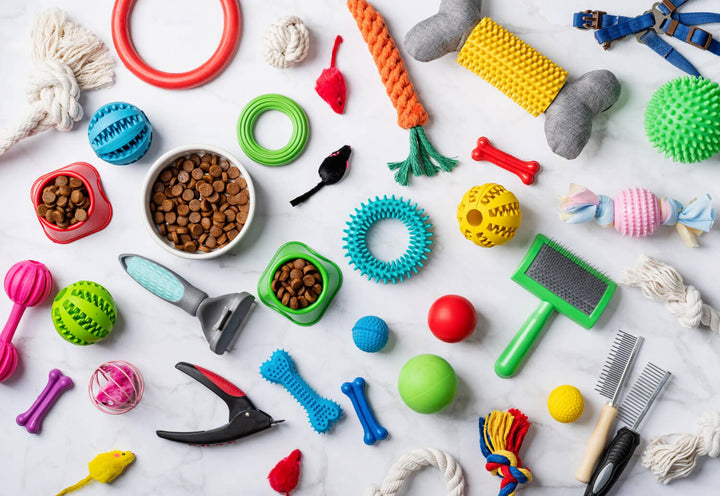
Hope You Enjoyed The Read!
Tag Cloud

A warm welcome from Lindsay & Huck (my English Pointer). Hope you enjoy the read and find just what you are looking for when it comes to living your best life with your loved pets.

-
Dog Breeds
(42)
-
Emotional Support Animals
(10)
-
Dog Grooming
(6)
-
Dog Health
(18)
-
Life with a Dog
(18)
-
Dog Nutrition
(11)
-
Service Animals
(11)
-
Dog Training
(5)

